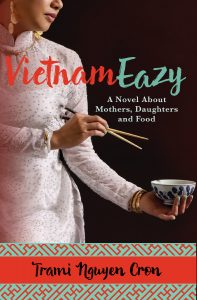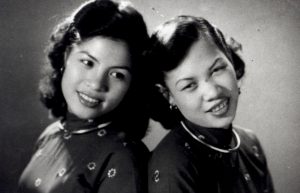By Sharon Simonson
SAN JOSÉ—For Vietnamese American author Trami Nguyen Cron, the irony weighs heavy.

Vietnamese people, whether refugees or immigrants, typically have fled their homeland for the United States in pursuit of freedom for themselves and their families. But once resettled, they seek to control their children’s lives to an extraordinary degree, essentially robbing the children of the very freedom the parents often sacrificed much to gain.
“Vietnamese people need to stop defining success as how much money you make or your professional title,” she says. “One of my challenges to my culture is to rethink its definition of success.”
That is the primary message—but in no way the only one—she hopes to send with her first novel, “VietnamEazy,” released today by publisher Wellstone Books, an arm of the Wellstone Center in the Redwoods near Santa Cruz.
Born in Saigon, Cron left Vietnam with her family when she was 8-years-old. They initially moved to France, where her grandmother, uncles and cousins still live and where she visits often. When she was 11, she moved with her family to the United States, eventually settling in Salt Lake City with her mom, step-father and siblings. She now lives in San José.
Her book’s story unfolds around the art of Vietnamese cooking and the adaptation of its practice to American tastes and available ingredients. “VietnamEazy” is the main character’s descriptor of the approach: how to make complicated Vietnamese dishes easily. But across its 164 pages, Cron also explores the difficult and sometimes counterproductive relationship between mothers and daughters and the sometimes dueling impulses felt by Vietnamese-American children to adhere to family expectations or to follow their own hearts and minds, risking family condemnation.

In telling her tale, Cron, 43, seeks to broaden the American perception of the 1.7 million people of Vietnamese descent living in the United States. Vietnamese people express, live and have created a culture that is much bigger than that of refugee and war survivor, she argues: “When you Google ‘Vietnam,’ everything is ‘Vietnamese War,’ and there is a whole different aspect of society that doesn’t have anything to do with the military.”
Even into her mid-30s, the Vietnamese community in the United States embarrassed her. But her attitude changed after she visited Vietnam to research the book, which includes some elements of her own life but is mostly fictional. She did not anticipate the personal transformation that returning to her ancestral homeland would render. Her travels produced empathy for her Vietnamese brothers and sisters and revealed a visceral cultural affinity. “I never thought I would say, ‘I love this place,’ but I did,” she says.
As soon as she arrived in Vietnam, she noted that chairs and tables in restaurants, for instance, were crafted with the relatively diminutive stature of Vietnamese people in mind. She herself is 5-feet-2-inches “without my heels,” she says. Store counters were lower also, hitting her closer to waist level rather than nearer her chest, as is commonly the case in the United States.![]()
Two years ago, she moved to San José from Santa Cruz, more particularly to the city’s East Side Little Saigon neighborhood with its high concentration of Vietnamese and Vietnamese American residents. She hoped to experience the same affinity with her neighbors that she found in Vietnam. She has not been disappointed.
Her goal now is to aid the Vietnamese community, which has the highest unemployment rate of all six major Asian populations in the United States and the second-lowest household median income. She hopes to help the Vietnamese people in San José to lift living standards by accessing government services and by integrating more fully into the larger society. Last year, District 7 San José City Councilperson Tam Nguyen appointed her to the city’s 11-member Parks and Recreation Commission.![]()
California has the largest Vietnamese population in the country by far: not quite 650,000 people versus not quite 230,000 in Texas, the next highest. The Vietnamese population in the United States nearly tripled from 1990 to 2010. San José has the largest Vietnamese population among U. S. metros, but it is not the fastest-growing.
The Vietnamese are the most segregated Asian population in the country relative to the non-Hispanic white population and have not integrated at a national level in any meaningful way, according to a 2013 study by John Logan and Weiwei Zhang of the sociology department at Brown University.
Census-tract data, the most fine-grained that the U.S. Census Bureau produces, reinforce that finding in the heart of Silicon Valley. Of all census tracts in Santa Clara County, those in the Little Saigon neighborhood of San Jose south of Interstate 280 between McLaughlin Avenue and Senter Road have the highest proportion of Vietnamese people, several in excess of 50 percent or nearly so. Outside of the vicinity, concentrations drop precipitously, often to less than a single percentage point.

“I want to encourage the younger generation to take what we learned from our parents and to try to adapt and learn from the Americans,” Cron says. “We can’t live the old-fashioned way.
“I also hope to affect the older generation in the way they are raising their kids, to be more open, less demanding and not live their dreams through their children,” she says.
Hicklebee’s Books in Willow Glen hosts a book-launch event for “VietnamEazy” beginning at 7 p.m. tonight.
Please RSVP to vietnameazy@gmail.com
Hicklebee’s Books, 1378 Lincoln Ave., San José, (408) 292-8880